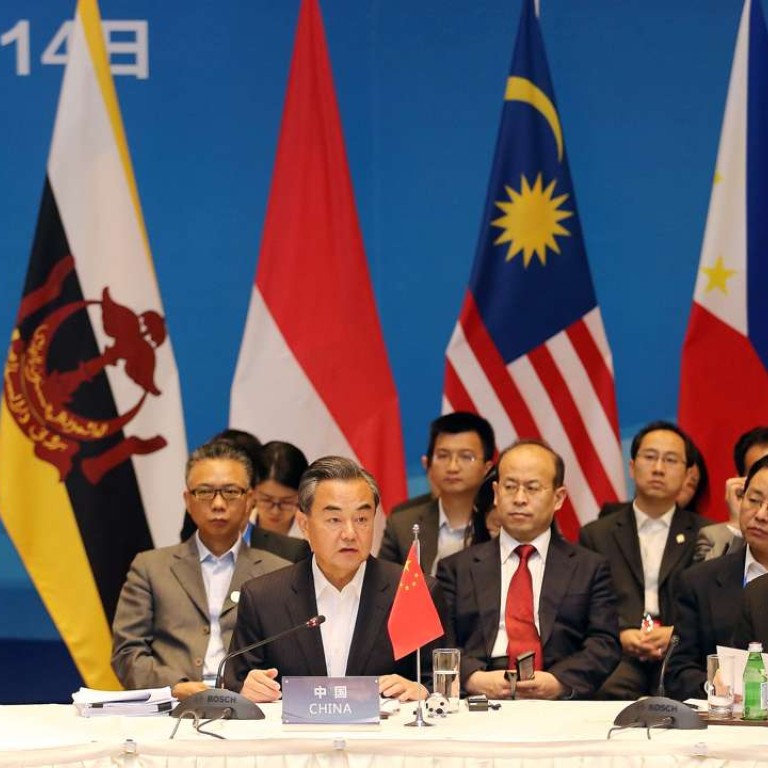
What to expect from Asean statement on Hague court’s South China Sea rulings
Southeast Asian bloc’s credibility at stake in reaction to case against China
Southeast Asian nations recently failed to get tough with China over territorial disputes in the South China Sea but they’re still likely to come up with a joint statement on an international tribunal’s impending rulings on China’s extensive claims.
With the rulings by the Permanent Court of Arbitration at The Hague expected next week, observers say the credibility of the Association of Southeast Asian Nations will be at stake if the bloc fails to find a common stance on the case the Philippines brought against China.
I think Asean would lose even more credibility than it has already if it didn’t make a statement
Asean will be keen to move on from last month’s diplomatic debacle, when it rescinded an unusually tough statement on China just hours after it was issued on June 14 at the end of a meeting between China’s foreign minister and Asean foreign ministers in Kunming.
But, more importantly, say diplomatic analysts, the bloc’s 10 members need to demonstrate they can set aside their differences and avoid Asean being further undermined by the divisive issue of how to deal with an increasingly assertive China.
“I think Asean would lose even more credibility than it has already if it didn’t make a statement [in response to the tribunal’s rulings], so I think it is likely,” said Alexander Neill, a researcher at the London-based International Institute for Strategic Studies.
Dr Daniel Chua, from Singapore’s Nanyang Technological University, said that if Asean wanted to avoid being divided, “the onus is on Asean members to stay together”.
“Asean cannot rely on external powers to make itself more cohesive and united,” he said.

Professor Huang Jing, a Sino-US relations expert at the National University of Singapore, said: “I don’t think the real question is about whether Asean will be able to issue a joint statement upon the release of the tribunal’s ruling. Rather, it is more about what it has to say,” he said.
Derry Aman, a senior Indonesian diplomat, was quoted by the Jakarta Post on June 10 as confirming that Asean was trying to “reach a common understanding on a possible statement”.
However, given the deep-rooted disunity among Asean nations regarding maritime disputes with China and Beijing’s growing regional influence, analysts said it would be unrealistic to expect a strongly worded consensus, which could further infuriate China, one of Asean’s top trade partners.
Noting that Asean had yet to form unified foreign and security policies, Professor Pang Zhongying, from Renmin University in Beijing, said its efforts to reach a consensus on the tribunal’s rulings were likely to be hampered by the delicate relations among its member nations.
While four Asean nations – the Philippines, Vietnam, Malaysia and Brunei – have claims to disputed waters in the South China Sea, one of the world’s busiest trade routes, that overlap with China’s, they also have competing claims among themselves.
Carlyle Thayer, an emeritus professor at the Australian Defence Force Academy, said: “Asean should certainly be able to issue a joint statement ... but Asean consensus building is likely to dilute any sharp wording or reference to China.”
Analysts also urged China to refrain from attempting to divide Asean for short-term gain, saying that could pose serious challenges to China’s national interests in the long run.

Professor Rommel Banlaoi, director of the Philippines’ Centre for Intelligence and National Security Studies, said China had been successful in using its economic and political clout to gain the support of some Asean nations, such as Laos and Cambodia, on sensitive issues affecting China’s interests.
It is widely believed that behind-the-scenes intervention by Beijing led to last month’s rare and embarrassing decision by Asean to retract a previously agreed statement expressing “serious concerns” over China’s bold island-building efforts in the South China Sea and accusing Beijing of stoking tensions and undermining peace, security and stability in the region. Publicly, Beijing expressed dismay at the statement.
Dr Jay Batongbacal, a law expert at the University of the Philippines, said the debacle showed China was desperate and increasingly resorting to using leverage against smaller, less directly concerned Asean members to prevent the bloc from expressing a full-blown, unified position.
“China has interests to see Asean being united to address multifaceted security challenges in Asia,” Banlaoi said. “But China does not want to see Asean unity as a way to ‘gang up’ against China.”
Huang warned that if Beijing continued to exert pressure on Asean, it could backfire as Asean nations appeared to have sided with the United States-led coalition calling on China to respect a rules-based international order ahead of the tribunal’s rulings.
He said Beijing had made a “stupid mistake” in April when it claimed that partial support for its position in the maritime disputes from three Asean nations – Cambodia, Laos and Brunei – represented a diplomatic victory.
“Asean serves as a strategic buffer zone for China,” he said. “It will not be in China’s interest to see a divided Asean, let alone to split the bloc deliberately.”
Batongbacal said Asean’s differences over how to deal with China would decide if the bloc could come up with a joint statement on the tribunal’s rulings, not the member states’ positions on the maritime disputes .
“China does not need to divide and conquer Asean, because the bloc is divided on the South China Sea disputes to start with, and China is definitely worried about the coming ruling because it could provide a basis for unity within Asean about the maritime disputes,” he said.
While on the one hand the recent debacle might be viewed as favouring China in the short term, “in the long run it may be evidence of Asean becoming increasingly aligned against China”, Batongbacal said.

